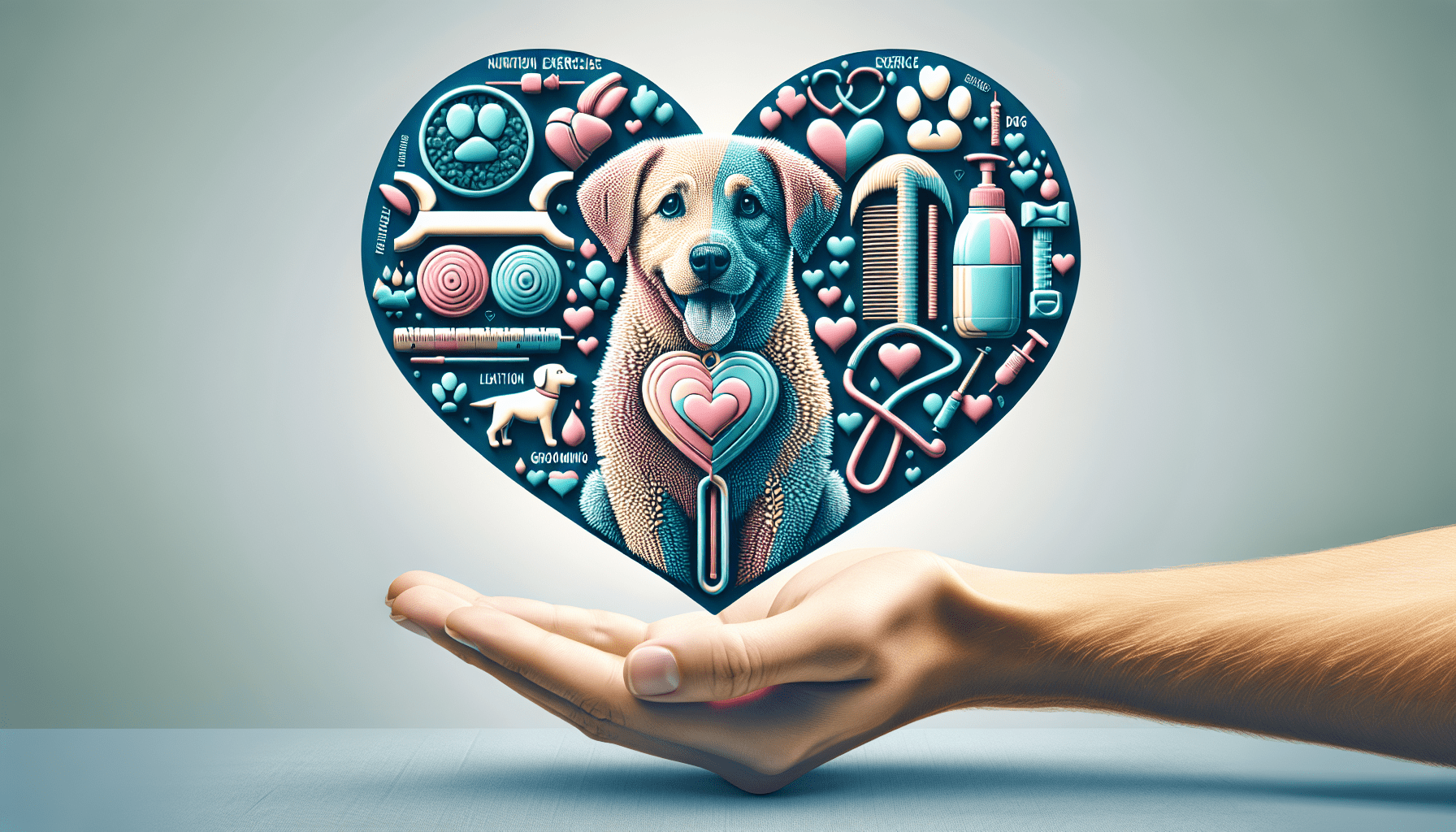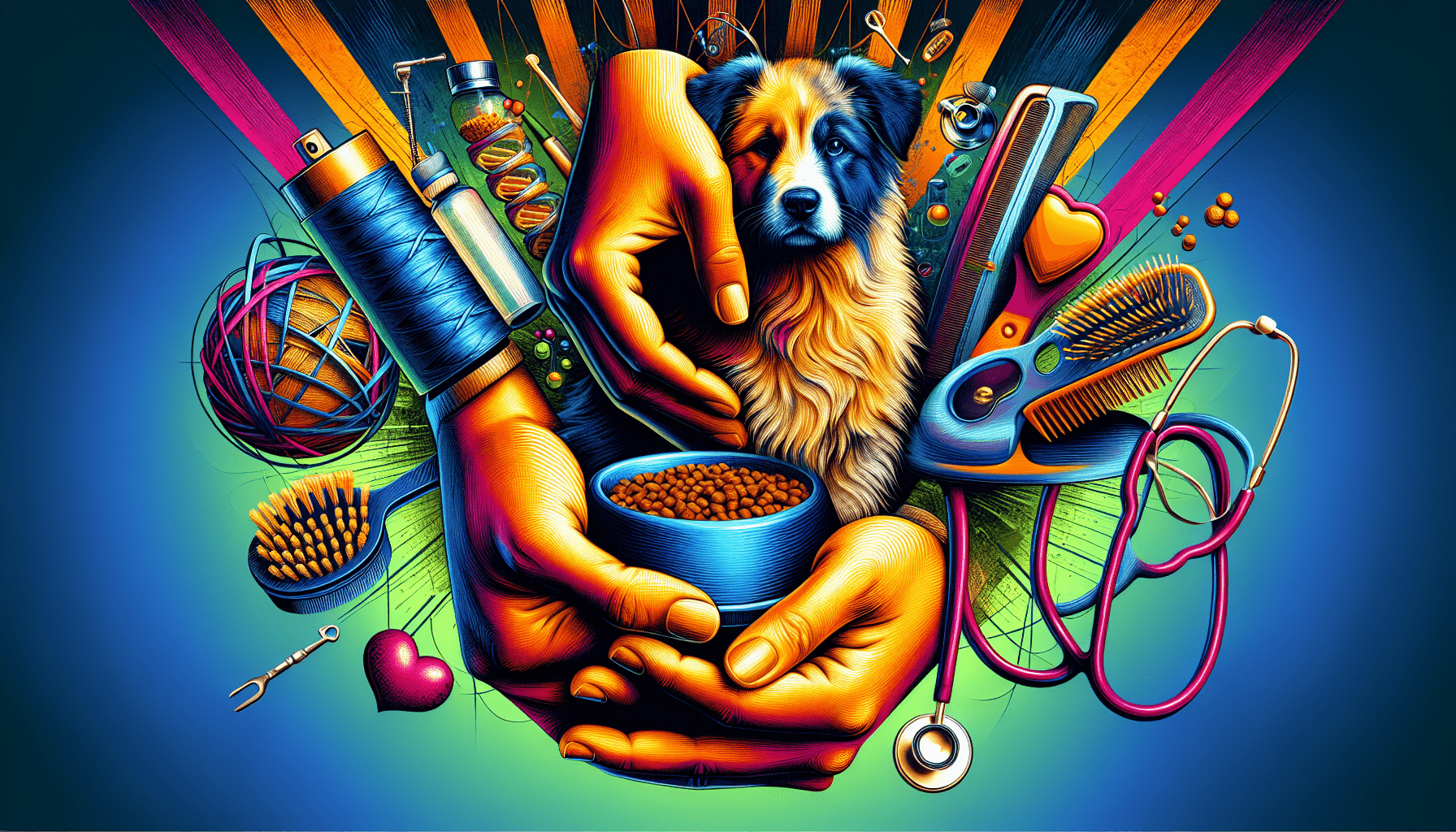Imagine a world where your furry friend is always happy and healthy. With a well-established pet care routine, you can make this dream a reality. From ensuring their nutrition to keeping them mentally stimulated, this article explores various aspects of creating a pet care routine that will not only benefit your four-legged companion but also strengthen your bond with them. So, grab a pen, take notes, and get ready to embark on a journey towards becoming the best caregiver your pet could ever ask for.

Setting Up a Schedule
Determine Daily Tasks
Creating a pet care routine begins with determining the daily tasks that need to be completed. These tasks may include feeding your pet, providing fresh water, cleaning litter boxes or cages, and administering any necessary medications. By identifying these daily tasks, you can establish a consistent routine that ensures your pet’s needs are met each day.
Establish Weekly Tasks
In addition to daily tasks, it is important to establish weekly tasks as part of your pet care routine. These tasks may include cleaning your pet’s living area, washing their bedding and toys, and performing basic grooming activities like brushing their fur. By organizing these tasks into a weekly schedule, you can ensure that your pet’s environment and hygiene are well-maintained.
Plan Monthly Tasks
Lastly, consider including monthly tasks in your pet care routine. These tasks may include more extensive grooming sessions, checking your pet’s teeth and ears, and updating any necessary preventive medications. By planning ahead, you can address these monthly tasks and ensure that your pet’s overall health and well-being are maintained.
Feeding and Watering
Provide a Consistent Meal Schedule
One of the most important aspects of pet care is providing a consistent meal schedule for your furry friend. Establish regular feeding times and stick to them as closely as possible. This helps maintain their digestive health and ensures that they receive the appropriate amount of nutrition each day. If you have a dog, consider dividing their meals into two or three smaller portions throughout the day to prevent overeating and aid in digestion.
Offer Fresh Water at All Times
Just like humans, pets need access to fresh water throughout the day. Ensure that your pet always has a clean bowl of water available, especially during hot weather or if they are particularly active. Monitor the water level regularly and refill it as needed to prevent dehydration. Remember to clean the water bowl frequently to maintain cleanliness and hygiene.
Monitor Food and Water Intake
It is essential to monitor your pet’s food and water intake as part of their care routine. Keep an eye on portion sizes and adjust them as needed to ensure that your pet is neither underfed nor overfed. Watch for any changes in appetite, as a sudden decrease in food intake could indicate an underlying health issue. Similarly, pay attention to excessive drinking or changes in water consumption, as this may also require veterinary attention.
Exercise and Playtime
Determine Appropriate Exercise Needs
Different pets have varying exercise needs, so it is crucial to determine what suits your furry friend best. Dogs generally require daily exercise through walks, runs, or playtime in a secure area. Cats benefit from interactive toys and play sessions to keep them mentally stimulated. Consider your pet’s breed, age, and overall health when determining the appropriate exercise routine which provides them with sufficient physical activity.
Create a Playtime Routine
Incorporating regular playtime into your pet care routine not only provides your pet with physical exercise but also strengthens the bond between you and your furry companion. Set aside dedicated time each day for play, such as throwing a ball for your dog or engaging in interactive play with your cat using toys. This routine helps keep your pet happy, active, and mentally stimulated.
Engage in Interactive Games
In addition to playtime, interactive games can be a valuable part of your pet care routine. For dogs, consider activities such as puzzle toys, obedience training, or agility exercises. Cats may enjoy chasing laser pointers, interactive treat-dispensing toys, or even learning tricks. These games provide mental stimulation and engage your pet’s problem-solving skills, contributing to their overall well-being.

Grooming and Hygiene
Establish Regular Brushing Sessions
Regular brushing is crucial for maintaining your pet’s coat health and reducing shedding. Set up regular brushing sessions based on your pet’s specific needs and coat type. Brushing not only helps remove loose fur and prevents matting but also provides an opportunity to bond with your pet. Remember to use appropriate grooming tools for your pet’s fur type and reward them with praise or treats during and after the brushing session.
Plan Bathing Schedule
Bathing requirements vary depending on the type of pet and their activity level. Dogs typically require more frequent bathing, while cats are known for their self-grooming abilities and may need bathing less often. Establish a bathing schedule that suits your pet’s needs, using pet-safe shampoos and conditioners. Be mindful not to bathe your pet too frequently, as it can strip their skin of natural oils and cause dryness or irritation.
Take Care of Dental Hygiene
Maintaining good dental hygiene is crucial for your pet’s overall health. Incorporate regular dental care into your pet care routine by brushing their teeth with specially formulated pet toothpaste and a soft-bristled toothbrush. Additionally, provide dental treats or toys designed to promote oral health. Regular dental care can help prevent dental diseases and ensure that your pet’s teeth and gums remain healthy.
Medical Care
Schedule Regular Veterinary Check-ups
Regular veterinary check-ups are essential for your pet’s well-being. Schedule routine visits with a trusted veterinarian to monitor your pet’s health, catch any potential issues early, and stay up to date with vaccinations and preventive treatments. A veterinarian can provide guidance on your pet’s specific needs and offer advice on nutrition, behavior, and overall care.
Keep Vaccinations up to Date
Vaccinations are crucial in preventing common and potentially life-threatening diseases in pets. Stay on top of your pet’s vaccination schedule and make sure they receive all necessary vaccinations, including those for rabies, distemper, and parvovirus for dogs, and FVRCP (feline viral rhinotracheitis, calicivirus, and panleukopenia) for cats. Regular vaccination helps protect your pet’s health and prevents the spread of diseases.
Administer Preventive Medications
In addition to vaccinations, preventive medications play a vital role in pet care. Discuss with your veterinarian which preventive medications, such as flea and tick treatments or heartworm preventives, are appropriate for your pet. Administer these medications according to the recommended schedule to protect your pet from parasites and other preventable health issues.
Maintaining a Clean Living Environment
Clean Pet’s Living Area Daily
Maintaining a clean living environment for your pet is essential for their health and well-being. Clean your pet’s living area daily, including litter boxes, cages, and bedding. Remove any waste promptly to prevent odor and ensure cleanliness. Regular cleaning helps prevent the buildup of bacteria or pests, creating a safe and comfortable space for your pet.
Wash Pet Bedding and Toys Regularly
Bedding and toys can harbor dirt, bacteria, and allergens, so it is important to wash them regularly. Follow the manufacturer’s instructions on washing and drying to ensure proper cleanliness without causing any damage. Select pet-safe detergents and avoid using strong scents or chemicals that may be harmful to your pet. Clean bedding and toys contribute to a healthier and happier living environment for your furry friend.
Use Pet-safe Cleaning Products
When cleaning your pet’s living area, it is crucial to use pet-safe cleaning products. Regular household cleaning products may contain harmful chemicals that can be toxic to animals. Opt for cleaning products specifically formulated for pets or use natural alternatives like vinegar and baking soda. These pet-safe options effectively remove dirt and odors without posing a risk to your beloved pet’s health.
Socialization and Mental Stimulation
Provide Social Interaction Opportunities
Ensuring that your pet has regular social interaction is vital for their overall emotional well-being. Dogs, for example, thrive on socialization with both humans and other dogs. Arrange playdates with other dogs, take them to dog parks, or attend obedience classes to provide social opportunities. Cats can benefit from interactive play with their humans or having fellow feline companions. Socialization promotes positive behavior and reduces the likelihood of behavioral issues.
Introduce Enrichment Activities
Enrichment activities are crucial for keeping your pet mentally stimulated and preventing boredom. Dogs may enjoy puzzle toys, treat-dispensing toys, or interactive feeding games that challenge their problem-solving abilities. For cats, try providing climbing structures, hiding food around the house, or interactive toys that mimic prey. Keep in mind that different pets have different preferences, so try various enrichment activities to find what is most enjoyable for your furry companion.
Take Time for Training
Training sessions are not only educational but also help establish a strong bond between you and your pet. Dedicate regular time to training sessions, focusing on basic obedience commands or teaching fun tricks. Use positive reinforcement techniques like treats, praise, and rewards to encourage desired behaviors. Training not only stimulates your pet’s mind but also enhances their overall behavior and responsiveness.
Monitoring and Observing
Watch for Any Abnormal Behaviors or Symptoms
As a responsible pet owner, it is important to monitor your pet for any abnormal behaviors or symptoms that may indicate an underlying health issue. Look out for changes in appetite, excessive thirst, lethargy, vomiting, diarrhea, or any other unusual symptoms. If you notice anything concerning, consult your veterinarian promptly to address any health concerns and ensure the well-being of your pet.
Monitor Weight and Body Condition
Regularly monitor your pet’s weight and body condition as part of their care routine. Obesity can lead to various health issues in pets, so it is essential to maintain a healthy weight. Familiarize yourself with your pet’s breed standards or consult your veterinarian to determine an appropriate weight range. Regularly weigh your pet at home or during veterinary visits to track their weight and make any necessary adjustments to their diet and exercise routine.
Track Pet’s Overall Well-being
In addition to monitoring specific behaviors or symptoms, keep track of your pet’s overall well-being. Pay attention to changes in their energy level, coat quality, and overall demeanor. Notice if they are experiencing any stress or anxiety. Taking note of these changes can help you identify potential issues and address them early on, ensuring that your pet remains happy and healthy.
Creating a Relaxing Bedtime Routine
Establish a Regular Sleep Schedule
A consistent sleep schedule is important for your pet’s health and well-being. Establish a regular bedtime routine, ensuring that your pet has a comfortable and quiet place to sleep. Provide a cozy bed or designated sleeping area that is inviting and secure. Stick to the same sleep schedule each night to promote a sense of routine and relaxation.
Create a Comfortable Sleeping Environment
To create a comfortable sleeping environment, consider your pet’s needs and preferences. Provide appropriate bedding or blankets that are clean and cozy, and ensure the sleeping area is free from drafts or excessive noise. For cats, consider having elevated resting spots or cat trees. Dogs may benefit from crate training or having a designated area where they feel secure. Creating a comfortable sleeping environment supports a good night’s sleep for both you and your pet.
Engage in Calming Activities Before Bed
Before bedtime, engage in calming activities to help your pet wind down. For dogs, a short evening walk or play session can help exhaust excess energy and promote relaxation. Some pets may enjoy gentle brushing or receiving a gentle massage. Cats may appreciate interactive playtime or a quiet, cozy space to unwind. Find what works best for your pet and incorporate these calming activities into your bedtime routine.
Emergency Preparedness
Keep a Pet First Aid Kit
Emergencies can happen, so it is crucial to be prepared with a pet first aid kit. Include items such as bandages, antiseptic solution, gauze pads, tweezers, and any necessary medications for your pet. Familiarize yourself with basic first aid procedures for pets and keep emergency contact numbers readily available. Having a well-stocked first aid kit can provide peace of mind and ensure that you can provide immediate care until professional help is available.
Know the Location of the Nearest Emergency Veterinary Clinic
In case of a pet emergency, it is essential to know the location of the nearest emergency veterinary clinic. Research and identify emergency veterinary clinics in your area, noting their contact information, address, and opening hours. Keep this information easily accessible, either stored in your phone or written down, so that you can quickly seek medical attention for your pet in urgent situations.
Have Contact Information for a Trusted Pet Sitter
Whether due to travel or unexpected circumstances, having contact information for a trusted pet sitter is important. Find a reliable individual who can take care of your pet in your absence or during emergencies. Provide them with detailed instructions on your pet’s routine, feeding preferences, medications, and any specific needs they may have. Regularly update the contact information and notify the pet sitter of any changes in your pet’s behavior or health.
In conclusion, establishing a comprehensive pet care routine involves a variety of tasks and considerations. From setting up a schedule and providing proper nutrition to ensuring regular exercise, grooming, and medical care, each aspect plays a crucial role in your pet’s overall health and happiness. By following these guidelines and tailoring them to your pet’s individual needs, you can create a routine that promotes their well-being, strengthens your bond, and ensures a fulfilling life for your beloved companion.
